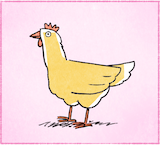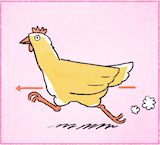


นี้คืออี่หยัง นี้คือไก่
ไก่มันเป็นอี่หยัง ไก่มันเป็นสัด
ไก่มันโตใหญ่บ่ บ่ ไก่มันโตบ่ใหญ่ ไก่มันโตพอดี
ไก่มันโตสีหญัง ไก่มันโตสีเหลียง
ไก่มันมีขาบ่ มีอยู่ ไก่มันมีขา
ขาไก่มันใหญ่บ่ บ่ ขาไก่มันบ่ใหญ่
ไก่มันมีปีกบ่ มีอยู่ ไก่มันมีปีก
ไก่มันมีปีกจักข้าง ไก่มันมีปีกสองข้าง
ไก่มันบินได้บ่ บินได้อยู่ แต่ว่าบินได้บ่สูง บินบ่สูงคือนก
ไก่มันมีปากบ่ มีอยู่ ไก่มันมีปากแหลมๆ
ไก่มันมีหงอนบ่ มีอยู่ ไก่มันมีหงอนไก่
หงอนไก่มันสีอี่หยัง หงอนไก่มันสีแดง
7
ไก่มันกำลังเฮ็ดหญัง ไก่มันกำลังแล่น
ไก่มันแล่นไปใส ไก่มันอาดสิแล่นไปข้างหน้า
คือลู้ว่าไก่มันกำลังแล่น กะลู้ เพาะว่าไก่มันแล่นแล้วมันเหยียบดิน ขี้ดินมันไง่ขึ้น
ไก่มันแล่นไปจักโต ไก่มันแล่นไปโตเดียว
ไก่มันแล่นเล็วบ่ บ่ลู้คือกันว่าไก่มันแล่นเล็วบ่ อาดสิแล่นเล็ว
8
ไก่มันกำลังเฮ็ดหญัง ไก่มันกำลังกินเญี่ย
ไก่มันกินเญี่ยอี่หยัง บ่ลู้คือกันว่ามันกินเญี่ยอี่หยัง อาดสิเป็นเข้ากะได้
ไก่มันกินเข้าอยู่ใส บ่ลู้คือกันว่าไก่มันกินเข้าอยู่ใส อาดสิกินอยู่เทิงพื้นขี้ดินกะได้
ไก่มันเล็วบ่ บ่ลู้คือกันว่าไก่มันกินเล็วบ่ อาดสิกินซ้า อาดสิค่อยๆ กินกะได้
Link to overview page
Link to dictionary
| Isaan | Pronunciation | Tones | Thai | English/Notes |
|---|---|---|---|---|
| นี้ | ni: | HF | นี้ | 1. this 2. here |
| คือ | khʉ: | HR | คือ | 1. to be, to resemble, like, as 2. why {บักหล้าคือบ่เก็บโต่ะแน่ = [addressing a young boy] Why haven't you cleared the table?} |
| อี่หยัง | i:-yaŋ | H-M | อะไร | 1. what {นี้คืออี่หยัง = What is this?} {มื้อนี้เจ้าเฮ็ดอี่หยัง = What are you doing today?} {กินเข้างายกับอี่หยัง = What did you have for breakfast?} 2. something, anything, (in negations) nothing {บ่ต้องเฮ็ดอี่หยังอีกเลยนอกจากใส่ปุย = [we] don't need to do anything besides adding fertilizer} |
| ไก่ | gai | H | ไก่ | chicken |
| มัน | man | HR | มัน | it (also used to refer to people) |
| เป็น | pen | M | เป็น | 1. to be, to exist 2. to be able to 3. to suffer, sth. happens to 4. เป็นหญัง[...]คือ in initial position: why? {เป็นหญังเขากะคือแปงฟัน = Why is he brushing his teeth?} {เป็นหญังเคี่ยงบินมันคือสิตก = Why is the airplane falling down?} |
| สัด | sat | M | สัตว์ | animal |
| โต | to: | M | ตัว | 1. body, self 2. clf. for animals, characters/letters/consonants, appliances, clothes (e.g., pairs of trousers, shirts) |
| ใหญ่ | ɲai | H | ใหญ่ | large, big |
| บ่ | bɔ: | H | ไม่ | 1. no, not 2. question particle, transforming a statement into a question Notes: spelling exception in line with common usage on social media |
| พอดี | phɔ:-di: | HR-M | พอดี | 1. to fit well 2. appropriate, just enough, just right {กะจกบานบ่ใหญ่ กะจกบานพอดี = not a large window, just right} {พอดีมือของเฮา = just right for his hand} 3. just in time, at the right moment, just this moment {แล้วพุซายคนนี้กะญ่างมาพอดี = and the man has come just now} |
| สี | si: | M | สี | 1. color 2. colored pencil, crayon |
| หญัง | ɲaŋ | M | อะไร, เป็นหญัง = ทำไม | 1. what {เขากำลังเฮ็ดหญัง = What is he doing?} {ธูปเอาไว้เฮ็ดหญัง = What are incense sticks for?} 2. something, anything, (nothing) 3. เป็นหญัง[...]คือ in initial position: why {เป็นหญังเขาคือใส่บักพิกลงไปในกวยเตียว = Why is he putting chili in [his] noodle soup?} {เป็นหญังหน้าต่างมันคือเปิด = Why is the window open?} {เป็นหญังมันคือมีควนไฟ = Why is there smoke?} |
| เหลียง | li:aŋ | M | เหลือง | yellow |
| มี | mi: | HR | มี | 1. to have 2. there is |
| ขา | kha: | M | ขา | leg {ขาหน้า = front leg} {ขาหลัง = hind leg} {ส้งขาญาว = long trousers} |
| อยู่ | yu: | H | อยู่ | 1. to be (located) at 2. yet, still 3. auxiliary indicating continuous or progressive action {ทอดปาอยู่ในกะทะ = (in the process of) frying a fish in the pan} {แม่กำลังเมี้ยนเฮียนอยู่ = mother is cleaning/tidying up the house} |
| ปีก | pi:k | LF | ปีก | wing |
| จัก | jak | M | จัก | 1. answer to a question: [I] don't know, don't know exactly, [I'm] not sure {พุซายคนนี้เขาเถ้าไป่ จัก จักเถ้าหลือบ่เถ้า เบิ่งบ่ค่อยออก = Is this man here already old? I don't know. I can't see clearly whether he's old or not.} {เขาเว้ากันอยู่ใส จักคือกัน = Where are they talking? I don't know either.} 2. exact(ly), what exactly {จักต้มอี่หยังกะบ่ฮู้ = I don't know what (exactly) he is cooking} {บ่ลู้คือกันจักปาอี่หยัง = I don't know either what kind of fish this is} 3. how much/many? {ต้นไม้มีจักต้น = How many trees are there?} {ตอนนี้จักโมงแล้ว = What time is it now?} {มือของเฮานี้สิมีจักนิ้ว = How many fingers do our hands have?} 4. a bit, a little bit {จักหน่อย/จักหน่อยหนึ่ง = a bit, a little bit} |
| ข้าง | kha:ŋ | LF | ข้าง | 1. side {มีหูจับสองข้าง = there are handles on both sides} 2. next to {วางอยู่ข้างๆ ก่องใบใหญ่ = it's placed next to the large box} {เขายืนอยู่ข้างๆ อีกพุหนึ่ง = he's standing next to another person} 3. clf. for body parts which come in pairs (eyes, ears, legs etc.) {เขามีตาสองข้าง = she has two eyes} |
| สอง | sɔ:ŋ | M | สอง | two |
| บิน | bin | M | บิน | to fly |
| ได้ | dai | HF | ได้ | 1. can 2. to get, to obtain 3. before verb: indicating past tense 4. บ่ได้ + verb: not |
| แต่ว่า | tɛ:-wa: | H-H | แต่ว่า | 1. but 2. only {ฮู้แต่ว่าเขายืนอยู่พุเดียว = I only know that he's standing there by himself} |
| สูง | su:ŋ | M | สูง | high, tall |
| นก | nok | H | นก | bird |
| ปาก | pa:k | LF | ปาก | mouth |
| แหลม | lɛ:m | M | แหลม | sharp |
| หงอน | ŋɔ:n | M | หงอน | crest, comb (chicken) |
| แดง | dɛ:ŋ | M | แดง | red |
| กำลัง | gam-laŋ | M-HR | กำลัง | auxiliary indicating continuous or progressive action |
| เฮ็ด | het | H | ทำ | to do, to make |
| แล่น | lɛ:n | H | วิ่ง | to run {ไก่กำลังแล่น = the chicken is running} {เด็กน้อยกะแล่นเหล้น = the kids are running around} {ลดไฟกำลังแล่น มันแล่นอยู่เทิงลาง = the train is running, it's running on rails} {เลียแล่นไปแล่นมา = ships are going back and forth} |
| ไป | pai | M | ไป | 1. to go 2. auxiliary indicating action extending into the future |
| ใส | sai | M | (ที่)ไหน | 1. where? {สิไปใส = Where are [you] going?} {มาแต่ใส = Where are [you] coming from?} {กะทะอยู่ใส = Where's the pan?} 2. somewhere, anywhere {ใสกะได้ = anywhere, wherever you like} |
| อาด | a:t | LF | อาจ | 1. might, may, will 2. likely |
| สิ | si | M | จะ | future tense auxiliary {เขากำลังสิตื่น = he's about to wake up} {สิไปตะหลาด = [I'm] going to the market} |
| ข้างหน้า | kha:ŋ-na: | LF-LF | ข้างหน้า | in front, forward |
| ลู้ | lu: | HF | รู้ | 1. to know 2. to understand Notes: equivalent to ฮู้ |
| ว่า | wa: | H | ว่า | 1. that, as {คำว่า X = the word X} 2. to say |
| กะ | ga | M | ก็ | 1. then, consequently 2. also |
| เพาะว่า | phɔ-wa: | H-H | เพราะว่า | because |
| แล้ว | lɛ:o | HF | แล้ว | 1. finished 2. already 3. and then, and next (especially แล้วกะ) 4. auxiliary for past tense |
| เหยียบ | yi:ap | LF | เหยียบ | to step on, to tread on, to run over |
| ดิน | din | M | ดิน | earth, soil |
| ขี้ดิน | khi:-din | LF-M | ดิน | earth, soil |
| ไง่ | ŋai | H | ฝุ่น | dust |
| ขึ้น | khʉn | LF | ขึ้น | 1. to go up, to increase 2. sun: to rise {ตะเว็นกำลังขึ้น = the sun is rising} 3. more 4. bus/train etc.: to get on, to board {พุโดยสานขึ้นลดไฟเบิดแล้ว = all passengers have boarded the train} |
| เดียว | di:ao | M | เดียว | only, alone, single |
| เล็ว | leo | HR | เร็ว | fast, quick |
| คือกัน | khʉ:-gan | HR-M | เหมือนกัน | 1. also, likewise, similarly {ยินดีที่ได้ฮู้จักคือกันคับ = Nice to meet you too!} 2. in negative sentences: either {บ่ลู้คือกัน = I don't know either} {จักคือกัน = I don't know (either)} |
| กิน | gin | M | กิน | to eat, to consume, to use |
| เญี่ย | ɲi:a | H | อาหารของสัตว์ เช่น ไก เป็ด นก | food for chicken, birds etc. |
| เข้า | khao | LF | ข้าว | rice {กินเข้า = to eat} {ปูกเข้า, เฮ็ดเข้า = to grow/plant rice} {เกี่ยวเข้า = to harvest rice} {กับเข้า = courses eaten with rice} |
| เทิง | thə:ŋ | HR | บน | 1. on, on top of, at, in {เทิงโต่ะ = at/on the table} {กบมันนั่งอยู่เทิงใบบัว = the frog is sitting on the lotus leaf} {เทิงท้องฟ้า = in the sky} {มันแล่นอยู่เทิงลาง = [the train] runs on rails} {มีคนนั่งอยู่เทิงลดสามล้อสามคน = there are three people sitting in the tuk tuk} 2. up, upward Notes: pronunciation: also realized as ทัง |
| พื้น | phʉ:n | HF | พื้น | 1. floor, ground 2. surface, area {หล่นลงไปลงพื้น = [it] falls to the ground} {เขานั่งอยู่เทิงพื้น = he's sitting on the floor} |
| ซ้า | sa: | HF | ช้า | 1. slow 2. late, delayed |
| ค่อย | khɔ:i | H | ค่อย | 1. soft, gentle 2. little by little, gradually |